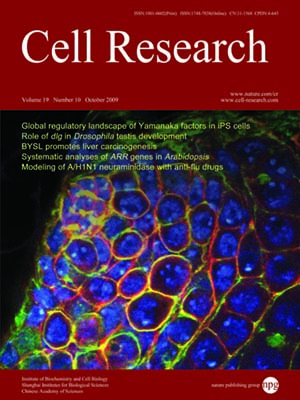
Volume 19, No 10, Oct 2009
ISSN: 1001-0602
EISSN: 1748-7838 2018
impact factor 17.848*
(Clarivate Analytics, 2019)
Volume 19 Issue 10, October 2009: 1150-1164
ORIGINAL ARTICLES
Bystin-like protein is upregulated in hepatocellular carcinoma and required for nucleologenesis in cancer cell proliferation
Hanzhi Wang1,2, Wei Xiao3, Qinbo Zhou1,2, Yun Chen4, Shuo Yang1, Jiansong Sheng1, Yanqing Yin2, Jia Fan5 and Jiawei Zhou1,2
1Laboratory of Molecular Cell Biology, Institute of Biochemistry and Cell Biology
2State Key Laboratory of Neuroscience, Institute of Neuroscience, Shanghai Institutes for Biological Sciences, Chinese Academy of Sciences, Shanghai 200031, China
Correspondence: Jiawei Zhou,(jwzhou@ion.ac.cn)
The bystin-like (BYSL) gene was previously characterized to encode an accessory protein for cell adhesion that participates in early embryo implantation. It is also involved in 40S ribosomal subunit biogenesis and is found to be expressed in rapidly growing embryo and cancer cell lines. In order to explore the role of BYSL in cancer cell proliferation and growth, we used hepatocellular carcinoma (HCC) as a model. Here, we report that BYSL is crucial for HCC cell growth both in vitro and in vivo. Expression levels of BYSL mRNA and protein in human HCC specimens were markedly increased compared with those seen in adjacent non-cancerous tissue. In vitro, inhibition of BYSL by short hairpin RNA decreased HCC cell proliferation, induced apoptosis and partially arrested the cell cycle in the G2/M phase. In vivo, HCC cells treated with BYSL siRNA failed to form tumors in nude mice after subcutaneous implantation. To determine the cellular basis for BYSL RNAi-induced cell growth arrest, BYSL subcellular localization in mitotic and interphase HepG2 cells was examined. BYSL was present at multiple stages during nucleologenesis, including in nucleolus-derived foci (NDF), perichromosomal regions and the prenucleolar body (PNB) during mitosis. BYSL depletion remarkably suppressed NDF and PNB formation, and disrupted nucleoli assembly after mitosis, resulting in increased apoptosis and reduced tolerance of HCC cells to serum starvation. Taken together, our studies indicate that upregulated BYSL expression plays a role in hepatocarcinogenesis.
Cell Research (2009) 19:1150-1164. doi: 10.1038/cr.2009.99; published online 18 August 2009
FULL TEXT | PDF
Browse 1906


